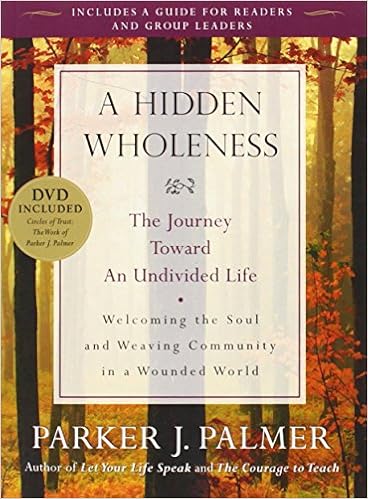Book review by Schalk Jacobs for Enlivening Edge Magazine

Besides A Hidden Wholeness – The Journey toward an Undivided Life: Welcoming the soul and weaving community in a wounded world, Parker J. Palmer is the author of seven other books including the best-selling Let Your Life Speak and The Courage to Teach. He is considered as a key “agenda-setter” of the past decade, and has been acknowledged with eight honorary doctorates and several national awards.
In this book, Palmer ties together the core themes of 40 years of work: the shape of the integral life, the meaning of community, teaching and learning for transformation, and the importance of nonviolent social change.
On the one hand, A Hidden Wholeness is a how-to book: how to form and use circles of trust to allow members to discover their inner teacher, their soul, the real person. A great addition is the addendum by Caryl H Casbon and Sally Z Hare on how to create and run circles of trust, expanding on and providing practical tips on creating and running circles of trust.
The paperback edition includes a DVD, which the Kindle edition obviously doesn’t. (I wonder when Amazon will realize there are ways of including the contents of a DVD with a Kindle edition).
Palmer’s description of guiding principles for circles of trust is perhaps the clearest indication of what it means to create a space for wholeness in evolutionary/Teal organizations. As he so eloquently puts it “Convinced that people lack inner guidance and wishing to “help” them, we feel obliged to tell others what we think they need to know and how we think they ought to live.
Countless disasters originate here − between parents and children, teachers and students, supervisors and employees − originate, that is, in presumptuous advice-giving that leaves the other feeling diminished and disrespected.”
In circles of trust the only questions that are allowed are those that enable the recipient to explore him/herself. No leading questions, no advice, no commiseration, no congratulations, only questions that allow one to explore their inner self.
Although circles of trust may fit the culture of some organizations, and not others, the principles are essential for creating a culture of wholeness.
Palmer refers to another practice that evolutionary-Teal organizations can actually adopt and adapt for their purposes, namely the concept of “clearness committees”. Whilst circles of trust aim to assist each circle member to discover their inner teacher, a clearness committee is called together with the express purpose to help a specific person, the focus person, to obtain clarity about a vexing question(s).
The only purpose of the people serving on the committee is to create a space for the focus person – their own interests do not count. I can see how organizations can use this to determine the purpose of the organization, or teams to resolve their own purpose.
For me the best part of the book is the first half, where Palmer explains what he means by being whole. As he says, being whole does not mean being perfect. Nor does it mean that one day you are living a divided life, and starting on the next, you are living a whole life.
Palmer contends that we are born whole – each of us has a distinct personality from the day that we are born. As children we also have a clear sense of who we are. However, as we grow up, and grow older, and we get hammered (and “taught”), our ego comes into play. The primary purpose of the ego is to protect us. That is when we start displaying behaviors such as:
- We refuse to invest ourselves in our work, diminishing its quality and distancing ourselves from those it is meant to serve
- We make our living at jobs that violate our basic values, even when survival does not absolutely demand it
- We remain in settings or relationships that steadily kill off our spirits
- We harbor secrets to achieve personal gain at the expense of other people
- We hide our beliefs from those who disagree with us to avoid conflict, challenge, and change
- We conceal our true identities for fear of being criticized, shunned, or attacked.
This is what Palmer means by living a divided life – we have different masks for each role we play. So much so that we forget who we really are. And the inner teacher, the soul, the real me is like a wild animal, tough and resilient (look at our incredible ability to recover from the most horrendous circumstances,) yet also very shy.
The inner self retreats the moment others patronize us, or presume to “advise” us. This is why a holding environment, a safe space is so important. It is only in this space that the inner self feels safe enough to come out, to allow us to be our real selves.
Practitioners and managers who want to create or grow evolutionary/Teal organizations will do well to keep this book close at hand, so as to continually refresh their knowledge of what “wholeness” actually means, and of what is required to create a space that allows wholeness to flourish.
Another book that approaches the same subject of creating a holding environment from a different, maybe more pragmatic angle is The Heretic’s Guide to Best Practices, The Reality of Managing Complex Problems in Organisations by Paul Culmsee and Kailash Awati. Both these books are essential reading for anyone who wants to understand and discover “wholeness” in their organizations and in its members.
Schalk Jacobs helps entrepreneurs build vibrant, living organizations. Start-ups function as living organizations. He helps entrepreneurs scale their young firms to the next level without losing the vibrancy and agility of the start-up years. Schalk lives in Pretoria, South Africa.
Featured added by Enlivening Edge Magazine




